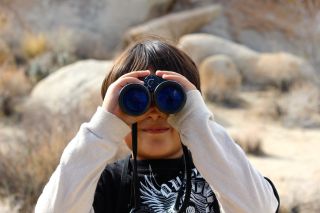Mindfulness
Getting Super Real in Daily Life
You can shatter inner pressure and step into the superpower of owning moments.
Posted August 31, 2023 Reviewed by Ray Parker
Key points
- People tend to fixate on mental habits of limitation and miss much of what is available in the moment.
- Research suggests anxiety, depression, and relationship struggles decrease with mindful observation.
- Learning to develop "super" observational skills helps you flexibly respond to situations despite challenges.

Listen up because this is not about capes or spandex. No need for otherworldly hocus-pocus or skills mere mortals can only marvel at.
You might never leap a skyscraper, but guess what? You can become an absolute super-being when it comes to your everyday encounters at home and work.
Don't misconstrue the term "super." It's not about topping or outdoing anyone. It's not about becoming a next-level version of yourself.
Remember Superman? He could fly, soaring above the planet at his whim. He dedicated himself to humanity despite his extraterrestrial origins. Yet, he grappled with never truly being human, not feeling he was sufficiently cutting it at connecting. A cosmic struggle we all can relate to.
Now, let's make one thing Crystal Palace clear: This is not about laser eyes or building-hopping. We're not discussing some elusive, secret power only a select few hold.
What is Super-Being?
What's this whole "super" thing then? Imagine, just for a moment, rising above the drama, the push and pull that muddles your relationships. It's like ascending, not to the moon, but to a bird's-eye view of your reactions and self-preservation peccadilloes.
Instead of blindly reacting to triggers, you gain an inch above the muck of shoulds and shouldn'ts, of self-defense and self-inflation, of pointing fingers and hiding shame.
How to Become a Super-Being
In my field, they call this "self-distancing" or slipping into a "third-person perspective." It's a mental and emotional jujitsu, a tactic to unstick yourself from the quicksand of your brain’s flight, flight, freeze reactivity. Researchers have delved into this and found that with intentional psychological distancing:
- Your decisions level up, with a sharper grasp of pros and cons.
- Your emotions—those anger fits or panic-laden episodes—can begin to come under your command.
- That relentless depressive rumination? You create your exit ramp from it.
- Problem-solving turns into creativity as you arrive at solutions resonating with the situation at hand.
But hey, this trick isn't new. About two thousand years back, Marcus Aurelius, the Roman emperor and Stoic philosopher, got it. He knew the juice of looking down on life's twists from a higher perch. Arguably (and to Lex Luthor’s envy), Aurelius—arguably the most powerful person on the planet at the time—said it best:
Take a view from above—look at the thousands of flocks and herds, the thousands of human ceremonies, every sort of voyage in storm or calm, the range of creation, combination, and extinction. Consider too the lives once lived by others long before you, the lives that will be lived after you, the lives lived now among foreign tribes; and how many have never even heard your name, how many will soon forget it, how many may praise you now but quickly turn to blame. Reflect that neither memory nor fame nor anything else at all has any importance worth thinking of.
— Marcus Aurelius, Meditations, 9.28
Here's the kicker: Super-being is for all of us. No extra-terrestrial crystals or bloodlines are required. You, me, anyone can cultivate the habit of soaking in the present moment, even in the heat of a chat with a friend, colleague, spouse, kid, or extended kin.
You learn to catch that fleeting instant, the molecule of life called “the moment.” It's like watching the world in 3D, unselfish, no strings attached. It’s peeling back the layers of action to the heart and mind beneath—the need to be seen, the thirst for worth, the craving for belonging – and seeing it inside yourself and X-ray-vision-like behind the surface of things for others too.
The Benefits of Being a Super-Being
Get set because we're not here to jump skyscrapers. We're here to dive into the grit of parenting, professional dealings, or relationships—no matter how tough or awkward. This habit of inner flexibility allows for more creativity, more leadership, more healing, and above all, more connections.
As a super-being, you'll sidestep the tug of war between right/wrong, win/lose, submit/dominate. You'll become what I call a “momentologist”—simultaneously seeing into, and engaging the possibilities or points of a given situation.
You'll sense the hidden strings of connection, the universal thread, and the factors you can and can't control. You'll own the consequences of your actions, embracing the truth of the moment, even if it ain't comfy or convenient.
Now, here’s the deal: Super-being is about acting like the pompous know-it-all. You aren't playing the superiority card. You’re dropping into the moment to access the spark of innovation, change, healing, and creation.
You’re the rebel against the humdrum routine of trigger-reaction, the cycle of quid pro quo. You’re the champion of "we" that springs from seizing the present, from understanding the layers beneath the surface.
You’re not a loner, either. Super-being is about seeing connections—between you, others, and the situations swirling around.
Sultan bin Salman Al Saud, the STS-51-G astronaut, nailed it from space: "Day one, we pointed at countries. Day three, continents. By day five, one Earth."
Edgar Mitchell, Apollo 14 astronaut, said that during his experience of super-being,
You develop an instant global consciousness, a people orientation, an intense dissatisfaction with the state of the world, and a compulsion to do something about it. From out there on the moon, international politics look so petty.
Here's the truth: praise and blame will always flicker around you. But guess what? The more you tap into your super-being meta-habit, the more these waves lose their grip. It becomes second nature, a reflex to ride out what’s hard.
Super-being reminds us that we're having a go at being human, entangled in the complexity of our emotions and experiences. And when we embrace this truth, it becomes easier to embrace the other person too, with their super-being-ness nestled within.
So, who wouldn't want to be super? Don’t sprint off to buy a cape, my friend. It's not about crafting a super-you. It's about unleashing the super-being that's been within you all along.
Try This: "Super-Breathing"
Here's the kicker: Who would you rather team up with? The ones stuck in a black-and-white cycle of blame and applause? Or those who see, feel, and harness the golden opportunities afforded by their super-being clarity? Wouldn’t you rather be among those who can detect the whispers of subtlety? Those who can stand up even when it's a bitter pill?
Today, here's your game plan. On a call or face-to-face, pause. As you inhale, feel the tension in your body. As you exhale, channel your inner super-being and soak in the non-reaction.
And why stop there? Add another round: inhale the awkward tension, exhale the non-doing. Embrace discomfort as your invitation to step up.
Go on, speak, or act from your super-being stance, and watch the magic unfold around you. The world may knock in two dimensions, but it’s those who rise into three that thrive.
References
Ayduk, O., & Kross, E. (2010). "From a distance: Implications of spontaneous self-distancing for adaptive self-reflection." Journal of Personality and Social Psychology, 98(5), 809-829.
Ayduk, O., Gyurak, A., & Luerssen, A. (2008). "Individual differences in the activation and control of affective information." Psychological Science, 19(4), 406-411.
White, R. H. and Carlson, S. M. (2015). What Would Batman Do? Self-distancing Improves Executive Function In Young Children. Developmental Science, 3(19), 419-426.
Kross, E. (2021). Chatter: The voice in our head, why it matters, and how to harness it. New York, NY: Crown.




